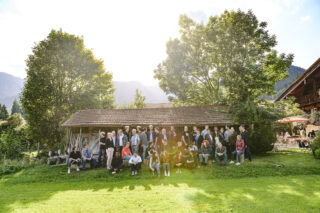Read next
Portrait: Tobias Schuster
“Actually, I ended up in research entirely by chance.”
Having been set on the path to science by a series of coincidences, Tobias Schuster now relishes the opportunity his work gives him to combine his different areas of interest. Part ten of our employee profile series.


© iStock.com/assalve
Tobias Schuster did not plan to follow a career path into research. There were no scientists in his personal milieu, so he had very little contact with the world of research. Tobias initially decided to study mechanical engineering at the Technical University of Munich. Then, while studying for his master’s degree, his interest in automotive engineering lead him to write a term paper on autonomous driving. This was his first encounter with artificial intelligence (AI), and he became fascinated by the topic.
What interested him most was deep learning and machine learning. “In a small-scale simulation with very little data, I was able to get my vehicle to drive autonomously down a race course. It was impressive how well it worked,” he recalls. Tobias took further steps down the road to specialization during a semester abroad in Copenhagen. He acquired a deeper knowledge of programming and ultimately wrote his master’s thesis on generating artificial data in order to train algorithms and contribute to making them safer.

© Fraunhofer IKS
Tobias Schuster: "For me, my work combines the best of different worlds."
When searching for a job after his studies, he prioritized looking for work in a field he found interesting. His job at the Fraunhofer Institute for Cognitive Systems IKS allows him to combine his talent for automotive and systems engineering with his interest in AI and his love of programming.
Significant freedom of choice
As a research fellow in the Safety, Reliability, Availability (SRA) department, Tobias is part of a team working on developing methods for safeguarding AI-based systems so that they can be used in safety-critical applications. What particularly appeals to Tobias is the practical slant that his work takes on through collaborations with industry partners, where research results are implemented directly into practice. “Seeing the results of your work in application gives you something tangible at the end of it all.”

Become part of the team and apply at Fraunhofer IKS!
Tobias describes his work as a continual process of discovery. Instead of consisting of strictly defined workflow steps, research generally involves moving gradually toward a solution through trial and error, with the opportunity to set your own areas of interest. Tobias has particularly come to treasure the freedom of choice enabled by the agile organizational structure at Fraunhofer IKS. This self-determination is also supported by IKS Academy through various further training opportunities.
Still tinkering on outside of work
The 26 year old finds the best way for him to switch off from work is playing sport with his friends, whether at the gym or his track and field club. His passion for DIY helps balance out his desk work too — he has not only built his own furniture, but also restored two old motor scooters. However, he emphasizes that there’s an overlap with research here too. “You have to solve a problem, so you try this and that to find a solution, and you’re happy when it works out in the end. That’s also the moment when I have the most fun at work.”
Meet our employees
Would you like to learn more about your colleagues at Fraunhofer IKS? Then take a look at the other portraits: To the employee portraits.


